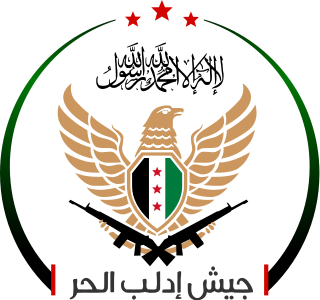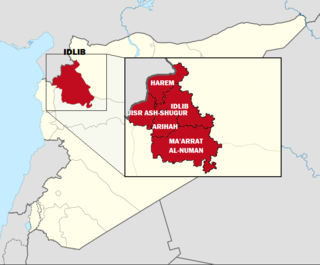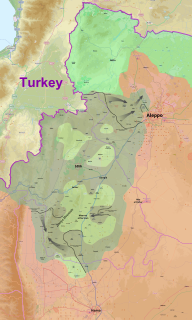
Idlib Governorate is one of the 14 governorates of Syria. It is situated in northwestern Syria, bordering Turkey's Hatay province to the north, Aleppo Governorate to the east, Hama Governorate to the south, and Latakia Governorate to the west. Reports of its area vary, depending on the source, from 5,933 km2 to 6,097 km2. The provincial capital is Idlib.

Khan Shaykhun, sometimes spelled Khan Sheikhoun or Khan Shikhoun, is a town in the Maarrat al-Nu'man District, within the southern Idlib Governorate of northwestern Syria.

Saraqib is a city in northwestern Syria, administratively belonging to the Idlib Governorate, located east of Idlib. During the course of the Syrian Civil War, the city fell into rebel forces in 2012 and was recaptured by the Syrian Army in 2020.

The siege of Wadi Deif refers to the siege of two Syrian Army bases, Wadi Deif and Hamadiyah, by rebel forces, starting on 11 October 2012, during the Idlib Governorate clashes of the Syrian civil war.
The inter-rebel conflict during the Syrian Civil War has continued throughout the Syrian Civil War as factions of the Syrian opposition and Free Syrian Army have fought each other, with shifting alliances among various Islamist factions such as Jabhat al Nusra, Ahrar al-Sham, Jaysh al-Islam and the Islamic Front.

Jund al-Aqsa, later known as Liwa al-Aqsa after 7 February 2017, was a Salafist jihadist organization that was active during the Syrian Civil War. Formerly known as Sarayat al-Quds, the group was founded by Abu Abdul 'Aziz al-Qatari as a subunit within the al-Nusra Front. The group later became independent, because al-Nusra was growing too rapidly for its resources and had suffered from fighting the Islamic State of Iraq and the Levant. On 20 September 2016 the U.S. Department of State designated Jund al-Aqsa as a terrorist organization. The group rejoined al-Nusra Front, by then renamed Jabhat Fateh al-Sham (JFS), in October 2016. However, on 23 January 2017, JFS declared that Jund Al-Aqsa was no longer part of Jabhat Fateh Al-Sham. In early February 2017, some of Jund al-Aqsa's units joined the newly formed Tahrir al-Sham, while the others refused and formed a new splinter group called Liwa al-Aqsa, and captured many towns in northern Hama and southern Idlib from other rebel groups. Following these attacks, Tahrir al-Sham launched a military operation against Liwa al-Aqsa, accusing them of being an ISIL affiliate. Following intense clashes with Tahrir al-Sham, up to 2,100 Liwa al-Aqsa militants left Idlib Province to join ISIL in Raqqa Province, by 22 February 2017.

The 13th Division is a Syrian rebel group sanctioned by the Syrian National Council. It was among the first armed Syrian opposition groups to receive U.S.-made BGM-71 TOW anti-tank missiles. The group's leader lieutenant colonel Ahmad al-Sa’oud said during an interview that the missiles were provided by the Friends of Syria, which also provided training on how to use the advanced weaponry. According to a spokesperson for the FSA's Supreme Military Council, the 13th Division is funded by sources within Qatar and Saudi Arabia.

The siege of Wadi Deif refers to the siege of two Syrian Army bases, Wadi Deif and Hamadiyah, by rebel forces, during the 2014 Idlib offensive of the Syrian Civil War. The first siege of these two bases was broken by the Syrian Army on 18 April 2013. During the siege, rebels detonated several 'tunnel bombs' underneath Army positions surrounding the bases, which was similar to the tactics used during the First World War.

The al-Nusra Front–SRF/Hazzm Movement conflict started in late October 2014, during the Syrian Civil War, in Idlib and Aleppo governorates, during which al-Nusra attempted to establish an Islamic state rival to that of ISIL. Despite this, the al-Nusra Front and Free Syrian Army factions continued to cooperate in the southern Syrian governorates of Quneitra and Daraa.

The Battle of Idlib was a military operation in the Idlib Governorate, during the Syrian Civil War, conducted by rebels against Syrian government forces defending Idlib city.

The Army of Conquest or Jaish al-Fatah, abbreviated JaF, was a joint command center of Sunni Islamist Syrian rebel factions participating in the Syrian Civil War.

The 2015 Idlib offensive refers to a series of rebel operations in the Idlib Governorate, during the Syrian Civil War. The offensive started with a rebel assault on the capital of the province, Idlib. According to The Economist, the capture of Idlib came about largely because Gulf Arab states "gave more backing to their proxies despite American objections."
The Syrian protests (2016) were a series of large-scale protests against the Syrian government and in support of the Syrian opposition taking place throughout opposition-controlled territory in Syria. The protests proliferated throughout the country due to the implementation of a partial ceasefire taking place after 27 February 2016.

The Free Idlib Army is a Syrian rebel coalition consisting of 3 armed groups from northwestern Syria affiliated with the Free Syrian Army: the 13th Division, the Northern Division, and the Mountain Hawks Brigade.

The October 2016 Idlib Governorate clashes are violent confrontations between the Salafist jihadist group Jund al-Aqsa and the Salafist Syrian rebel group the Ahrar al-Sham, supported by several other rebel groups. The two groups were previously allied during the 2016 Hama offensive, but sporadic clashes also occurred time by time.

The Idlib Governorate clashes , were military confrontations between Syrian rebel factions led by Ahrar al-Sham and their allies on one side and the al-Qaeda-affiliated Jabhat Fatah al-Sham and their allies on the other. After 7 February, the clashes also included Jund al-Aqsa as a third belligerent, which had re-branded itself as Liwa al-Aqsa and was attacking the other combatants. The battles were fought in the Idlib Governorate and the western countryside of the Aleppo Governorate.

On 19 February 2018, heavy clashes erupted between the newly established Syrian Liberation Front, which consists of Ahrar al-Sham and the Nour al-Din al-Zenki Movement, backed by the Suqour al-Sham Brigades, and Hayat Tahrir al-Sham (HTS) in the western Aleppo Governorate. The conflict soon spread to the Idlib Governorate and the SLF captured several towns from HTS. A ceasefire between the two groups was reached on 24 April 2018. Fighting again resumed on January 1, 2019, ending with a total HTS military victory on January 9.
Opposition–ISIL conflict during the Syrian Civil War started after fighting erupted between Syrian opposition groups and the Islamic State of Iraq and the Levant (ISIL). In early January 2014, serious clashes between the groups erupted in the north of the country. Opposition groups near Aleppo attacked ISIL in two areas, Atarib and Anadan, which were both strongholds of the fundamentalist Sunni organization. Despite the conflict between ISIL and other rebels, one faction of ISIL has cooperated with the al-Nusra Front and the Green Battalion to combat Hezbollah in the Battle of Qalamoun. By 2018, the Islamic State was destroyed in the territories held by the opposition.

The National Front for Liberation–Tahrir al-Sham conflict began on 1 January 2019 during clashes between Nour al-Din al-Zenki Movement and Hayat Tahrir al-Sham (HTS), after HTS launched an attack against the group in Darat Izza, Taqad, and Khan al-Asal fronts in rebel-held western Aleppo. The conflict ended on 10 January 2019, after the National Front for Liberation agreed to withdraw, allowing HTS to take over almost all of the remaining opposition-held areas of the Idlib pocket.
The Insurgency in Idlib is an ongoing insurgency in rebel-held areas in the Idlib Governorate between multiple factions ranging from supporters of the Syrian government to Syrian opposition elements to supporters and members of the Islamic State of Iraq and the Levant (ISIL). The insurgency has been marked by assassinations and bombings, as well as armed confrontations with small arms and raids.













